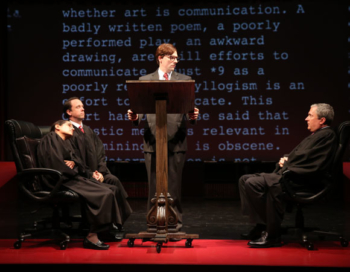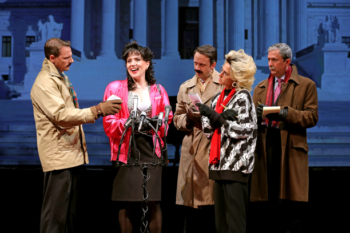

- Washingtonian April 4, 2014
- Chicago Sun Times March 12, 2014
- Chicago Tribune March 16, 2014
- Slate October 23, 2013
- Metro US October 21, 2013
- The American Conservative October 18, 2013
- Wall Street Journal October 7, 2013
- Gothamist October 2, 2013
- New York Magazine September 26, 2013
- The New York Observer September 24, 2013
- The Village Voice September 25, 2013
- Entertainment Weekly September 24, 2013
- Theater Mania September 24, 2013
- Curtain Up September 25, 2013
- The New York Times September 24, 2013
- The Village Voice September 4, 2013
- The Paris Review May 31, 2012
ARGUENDO Riffs on the Legality of Public Nudity
by Michael Dale
Perhaps there’s a barrister or two who might experience a bit of a thrill over the current proceedings at the Public’s LuEsther Theater, but generally speaking there’s nothing that can make even the sensual gyrations of a nightclub stripper lose their sex appeal like reducing it all to judicial procedure and legal jargon.
And that’s one of the funnier points of Elevator Repair Service‘s zany comical piece, Arguendo, a visual farce directed by John Collins that gets its text verbatim from a United States Supreme Court case regarding whether or not Indiana strippers should be forced to wear g-strings and pasties, rather than dance completely nude. (The title is a Latin legal term meaning, “for the sake of argument,” used to introduce a point as a matter of illustration.)
Barnes v. Glen Theater, regarding whether or not a public indecency law violated the First Amendment rights of strip club entertainers, climbed up a ladder of lower court decisions and appeals before reaching the highest court in the land in 1991. The dancers claimed that not being allowed to perform fully nude censored their artistic expression, although most of them seemed more concerned with the fact that they made less money while wearing pasties and g-strings. Among other issues, the court had to decide whether or not the act of being nude was a) a form of expression and not just a behavior, and b) an essential element to whatever was being expressed.
A talented company of five (Maggie Hoffman, Mike Iveson, Vin Knight, Susie Sokol and Ben Williams) plays multiple roles, including a dancer who came to listen to the case and the reporters outside the courthouse with pointed questions about her profession. (The text of the scene was taken from a television broadcast.)
While attorneys present their oral arguments, Ben Rubin‘s animated projections swiftly focus in on legal texts of cases and statutes being mentioned. Three robed actors wheeling around in office chairs cover the entire Scotus 9, who apparently questioned the lawyers giving their oral arguments with bits of dry humor and sarcasm.
When the matter of acceptable public nudity in theatre and opera performances is brought up, Justice Scalia asks about, “the good taste clause of the Constitution.” When the Chippewa Book Store is described as an establishment where customers enter private booths to observe nude dancers, Justice Rehnquist queries, “Why do they call this place a book store?”
There’s great attention to detail in recreating every pause, stutter and verbal overlap that occurred during oral arguments, and while there was undoubtedly a bit of laughter ringing through the halls of justice that day, Collins and his company broaden up their portrayals to achieve a Marx Brothers-like comedic rebellion. Eventually, a character does wind up completely nude and fully exposed to the audience, but perhaps not in the expected manner.
The 80-minute show is certainly fast and funny, but, like the type of dancing that’s the subject of Arguendo, it can be argued that the piece adds no artistic expression to its historic text and that it simply entertains. No matter. I had a swell time.